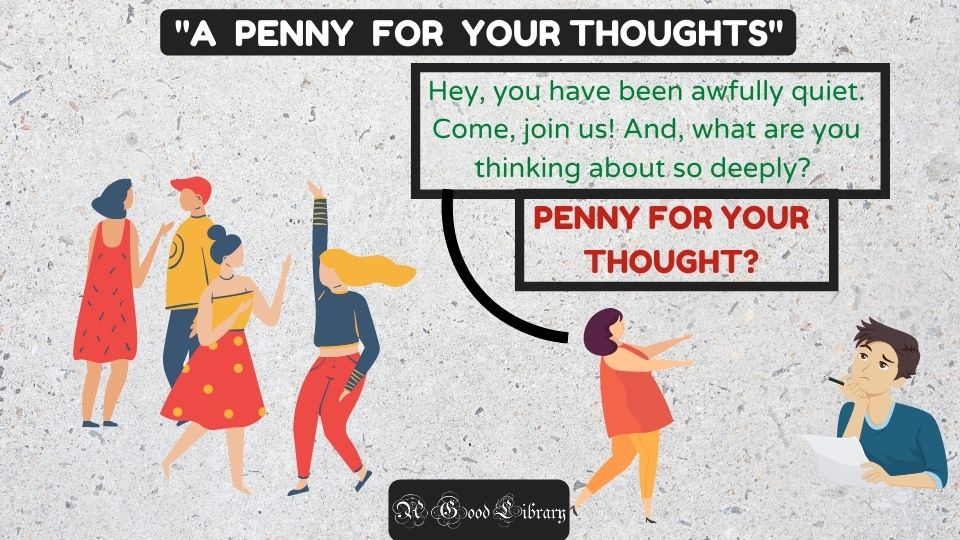‘A penny for your thought’ is one of those expressions that appear to have no connection between the literal meaning & figurative meaning. What would you think when someone will say “a penny for your thoughts” to you? Is the person comparing the worth of your thoughts with a penny? Or offering you a penny for the words you have said? So what does ‘A Penny for Your Thoughts’ mean?
‘A penny for your thoughts‘ is a metaphorical figure of speech used in a sentence to hear another person’s thoughts gently, who has been sitting quietly for a long time. By saying so, that person is trying to enter the world of your daydreaming politely. Using the idiom ‘a penny for your thoughts’ is trying to get the other person to talk who hasn’t spoken for quite some time.

An idiom that illustrates emotions rather than the literal meaning of the phrase. If you are familiar with idioms, try and get the literal meaning of any one of them, it will always point in some other direction.
Such as
Break a leg.
Here it doesn’t talk about breaking the leg of a person instead it’s an idiom used to wish good luck.
Hit the sack
The speaker doesn’t ask for banging your fist against the sack instead it’s an idiom to say go to sleep.
So, how would you get in the way of someone’s daydreaming without giving the feel of intrusion? By saying “a penny for your thoughts”. Read the further blog to know more about this idiom.
What’s the meaning of ‘A Penny For Your Thoughts’?
By definition, a penny for your thoughts is a metaphorical figure of speech used in a sentence to hear another person’s thoughts gently, who has been sitting quietly for a long time.
For example:
“Harry, you look pretty tense today, a penny for your thoughts”.
Here, the person is trying to ask Harry what thing is stressing him up without making him feel intruded.
If you notice your friend, David, sitting quietly for some time, what would you do?
You would go to him, try and figure out his mood and then speak, right? But what to say?
Hey David, “You have been quiet for a while, a penny for your thoughts.”
No interference, just a way of asking politely.
Where did the expression ‘a penny for your thoughts’ come from?
Tracing the exact origin of most idioms isn’t that simple. Similarly, the etymology of “A penny for your thoughts” says it was first used by Sir Thomas More in A Treatyce upon the last thynges, in 1535. A quote from the same
“In such wise yt not wtoute som note & reproch of suche vagaraunte mind, other folk sodainly say to them: a peny for your thought.”
The above-quoted phrase says that when people want a person who is being noticed as disconnected to step back into the conversation, they would say ‘a penny for your thoughts’.
If you look at the usage of the phrase in Sir Thomas More’s book “four last things ” published posthumously. The use of the phrase says that money was offered to a wise man who was silent to share his knowledge or insight.
And the idiom with the meaning that we know today became popular after a book written by John Heywood.
How to use ‘a penny for your thoughts’ in a sentence?
The meaning of a penny for your thoughts isn’t comparing your thoughts or insights worth with a penny. It’s a way of asking gently when you seem lost.
Rachel asked, “You seem pretty serious. A penny for your thoughts?”.
After presenting the world’s economic rate, the boss asked, ‘A penny for our thoughts’.
A penny for your thoughts? On the project I represented.
John noticed his friend’s pensive mood, so he asked: “A penny for your thoughts, Sherry.”
In all the above-cited examples, the idiom is either used to get to know what the other person is thinking or for a piece of their advice.

